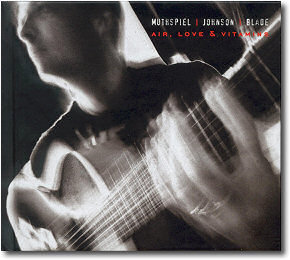|

Quinton Q-0402-2 / distrib.
Egea Records |
Muthspiel, Johnson, Blade
Air, Love & Vitamins
1.
Air, Love & Vitamins (Harry Pepl) 
2.
Panis Angelicus (Vince Mendoza) 
3. Kind Of In Between (Wolfgang Muthspiel)
4.
After 6 (Wolfgang Muthspiel) 
5.
Floater (Carla Bley) 
6. New Song (Aydin Esen)
7. Nydia (Wolfgang Muthspiel)
8. Snare – Tourists (Wolfgang Muthspiel)
Wolfgang Muthspiel
guitar
Marc Johnson
bass
Brian Blade
drums |
From the title of this album, Air, Love & Vitamins, just
the first element, "air", surely permeates the different ethereal and aerial
atmosphere of about all the tracks in the sequence. Three high-levelled
musicians are protagonists: double bass player Marc Johnson,
rhythm-melodic line in the glorious Bill Evans Trio, Brian
Blade and his impressionistic drum inflections, with whom
Wolfgang Muthspiel aligns himself. This young guitar player is
considered to be among the most interesting new representatives of the jazz and
classic-contemporary landscape (not to forget that he wrote compositions for the
Viennese ensemble "Klangforum", and performed in solo concerts at the London
Queen Elizabeth Hall and at the Vienna State Opera House).
Actually, Wolfgang already had some past experiences with both Johnson
(Perspective 1996 and Work in
progress 1999) and Blade (Daily
Mirror, 2000), with each of them
separately and also together on a previous disc in trio (Real Book
Stories, 2001). Not to mention that,
besides working with Gary Burton, Dave
Liebman, Paul Motian and Patricia
Barber on their own CDs, many renowned jazz-players appear on his
records, such as Bob
Berg, Peter Erskine, John
Patitucci, Tom Harrell, George Garzone, Joe
Lovano, and Gary Peacock. Which reflects the artistic depth of his
"young" career.
Since in its start this recording is mainly devoted to an acoustic
sound, hatched by the velvet and penetrating timbre of Johnson's double bass,
layered upon Blade's filamentous and thin rhythm textures: in respect of that,
in Harry Pepl's opening piece, Air, Love & Vitamins, the on/off switch is only useful for
amplifying the plain notes of Muthspiel's electric guitar, otherwise
voiceless.
An elegant and intimate sound comes out, where the neat and easy
phrasing of the guitar is perfectly inserted with a vague "scofieldish" stamp.
Incredible is the version of Panis
aneglicus, an air from the Christian religious tradition, with an
arrangement written by the eclectic and inexhaustible Vince Mendoza.
Here, the intimacy of the prayer is provided by the subdued tones, and also by
the simplicity of the solo fretwork of the guitar player. Exquisite example of
how much surprising the jazz can still and will ever be in its singular
realizations.
A particular appeal is stirred up in Kind of in between by the contrapuntal weaving
among the ten strings of guitar and bass, in the parts reserved to the two
instruments singularly: this denotes not only a wonderful acoustic syntony, but
also a sound mixture where no element serves as support to another, but everyone
is an accomplice and author of the overall result. The sober the walking bass in
After 6, taken down by
Johnson after the short guitar intro, and interposed by accentuations on the low
fractions that make the measure – seemingly – intriguing and inextricable, is on
the contrary an elementary one. Double bass soloing, elastic and elegant, rich
in colours, full-bodied but delicate in its touching, firm and dynamic in its
phrasing. A fresco of lightness, intentionally "corrupted", on the
coda, by the use – very moderate indeed – of the distortion on
Muthspiel's instrument, which gives rise to an energetic and whirling
crescendo.
Completely reduced to the complex structural elementariness of the
trio – and particularly of this one – floating Carla Bley's Floater: originally recorded by
Paul Bley's piano trio in 1963
(Footloose, Savoy), and then by Bley himself, it was re-proposed in the
early '90s with a homologue line-up, where
already Johnson's double bass appeared (Plays Carla Bley, Steeplechase).
In Muthspiel/Johnson/Blade's version, all drenched with an indefinite melodic
suspension and a tonal-harmonic indeterminateness, and restored in an impalpably
blues form by the cadences and the rhythm stress of Blade only, it seems marked
by such a research of sound responsiveness in silence, of which Miles Davis was
master and forerunner. On Blade's brushes, a vibrating Aydin Esen's slow ballad,
New Song, lets us come
back to a more lyrical dimension with the alternation of the chords – developed,
anyway, through over-recordings of the guitar – where the melodic and harmonic
tensions, cipher characteristic of this trio and its renderings, are solved by
the tonal hits of the Austrian guitarist. And in this sense, also Blade
lavishes, using several environmental percussions.
Less contiguous and more broken is the voice of the guitar on Nydia because of the lack of the
overlapping previously applied and with more interchange and intersection
between Muthspiel's and Blade's own strings: the result is a straight
performance, more truthful, where darting scales, rarely dirty or inaccurate,
have a precious role. An "aquatic" interlude from Blade's drums, someway
muffled, contrasting with the argentine squirts of his cymbals, on Snare; then, after a bland musical
accompaniment, in continuity Tourists, arpeggio of sixth/ninth spread throughout the tune,
whereas the theme is treated by cutting effects referable to the filtered
strings of Johnson, vibrated by the bow.
Stated that, where not differently indicated, the compositions are all
Muthspiel's works, the whole outcome is a very interesting disc under the point
of view of the emotion, where the variety of the proposals – tradition, ballads,
tensions, distension, originals – corresponds to the uniqueness of the
understanding between the featured players and to the fluid density of the main
– but not absolute or primary – voice of the guitar.
The last word is reserved to the quality of the graphic format: the
studied photographic games and paperboard case – well very strong – which makes
the package really a mini-book to leaf through.
Antonio Terzo for
Jazzitalia

